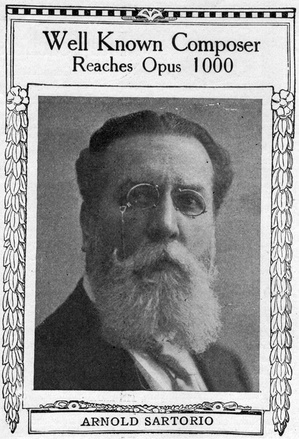 Although the American competitors in the Olympic Games in Sweden seemed to have the habit of establishing records, the German composers of to-day and yesterday are unquestionably the victors in all musical marathons. Few writers of other nationalities have ever had the persistence to write up to or beyond the Opus 1000. Arnoldo Sartorio, as the name implies, is of Italian extraction, although he was born at Frankfurt on Main, March 30, 1853, and is to all intents and purposes a German, as his entire training has been Teutonic. His teachers were August Buhl and Edward Mertke. For a time he was a choir conductor in Strassburg, Düsseldorf and Cologne. He also taught many successful pupils.
Although the American competitors in the Olympic Games in Sweden seemed to have the habit of establishing records, the German composers of to-day and yesterday are unquestionably the victors in all musical marathons. Few writers of other nationalities have ever had the persistence to write up to or beyond the Opus 1000. Arnoldo Sartorio, as the name implies, is of Italian extraction, although he was born at Frankfurt on Main, March 30, 1853, and is to all intents and purposes a German, as his entire training has been Teutonic. His teachers were August Buhl and Edward Mertke. For a time he was a choir conductor in Strassburg, Düsseldorf and Cologne. He also taught many successful pupils.
The one thousand mark in musical composition has been passed by very few composers. It is interesting to note how several writers have written so profusely and at the same time produced pieces for which there is a wide demand. Among the most fecund composers are: Bach, Handel, Haydn and Mozart among the great classic masters; Czerny, Schubert, Liszt and Gounod of a later period; and among modern writers, Abt, Behr, Bohm, Bordese, F. Kirchner, D. Krug, W. Popp, Engelmann.
It is the custom among composers to number their publications Op. 1, Op. 2, etc., Op. being an abbreviation of opus, meaning work. An opus may be a large and important work, a whole collection of pieces, or a mere trifle, as it may happen. Viadana (1564-1645) numbered his compositions in the modern way, but Beethoven was the first to use opus numbers regularly. Although Bach, Handel, Haydn and Mozart did not number their works, all four were very prolific, the compositions of each running well above the 1000 mark. Czerny’s opus numbers run above a thousand, each opus containing many separate pieces or studies. Schubert wrote 603 known songs (many others probably lost) in addition to numerous other compositions in practically all forms. Liszt is known chiefly by his many transcriptions, but his original works in many styles are numerous also. Franz Abt was a voluminous song writer; Bordese wrote hundreds of songs, studies and other vocal works. W. Popp wrote chiefly for the flute. Franz Behr (1837-1898) wrote many hundreds of popular drawing-room and teaching pieces under his own name, and many more under the pen-names “Wm. Cooper,” “Charles Morley,” “Francesco d’Orso,” “Charles Godard” and others. Carl Bohm, a contemporary writer, has hundreds of beautiful songs, as many more piano pieces, also violin and other instrumental works. H. Engelmann, so well known to our readers, has passed the 1000 mark and no longer uses Op. numbers.
Some of the world’s great composers have not been prolific to marked degree. Beethoven’s Op. numbers run a little past 100; Schumann’s, similarly; Chopin reaches Op. 73. Berlioz, who wrote larger works chiefly, probably attained the lowest Op. number of all, 28.



